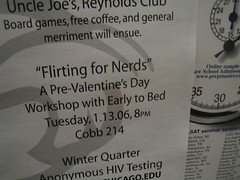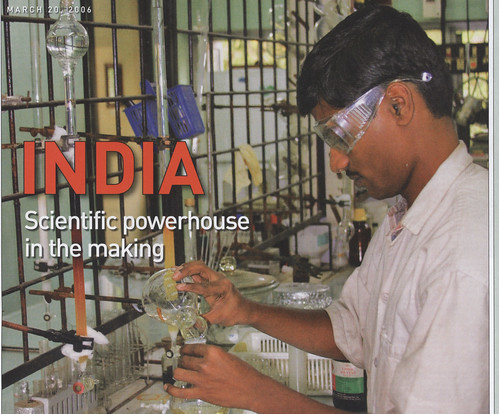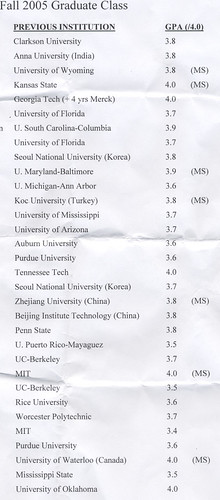You know you have been away from Singapore for too long when you have your fellow compatriots (both male and female, and FOB aka fresh off boat) saying "thank you" for holding the door open and allowing them to enter the nice, warm building from the bitter cold outside. They had been half-expecting me to slam the door shut in their faces. They were equally surprised to see me press the 'door open' button in the elevator and to wait to allow a person from Facilities to push a goods-laden cart in.
Excuse me?
Apparently, such basic acts of courtesy are quite rare back in Singapore. I remember reading through blogs deploring the lack of social graciousness especially amongst Singaporean males. Choice quotes are given below. Hmm, the main reason is perhaps best summed up by Unknown: ...I also think it has to do with society. Over here (in the US), there's more room for introspection and self-reflection.
What some women say about Sg guys:
Too funny!:
I usually don't depend on strangers to hold the lift for me. Most of the time, I'd rather wait for the next lift if I had to run in order to catch one. This is because you can't bet your life that anybody inside the lift will hold the "door open" button for you even if they see you running. I've GIVEN UP on Singaporeans on this aspect. Whenever I'm with Ophelia, either she's walking on her own and I'm holding her hand or if I'm carrying her, I will just saunter slowly up to a lift and press the call button to summon a lift. No point running and possibly hurting Ophelia when the bunch of idiots in the lift won't hold it for you anyway.
So just now, the same thing happened. This guy entered the lift at B3 ahead of me. He could see me walking towards the lift and I was quite near it already. I saw him jabbing at the lift-buttons panel - most probably to get the doors of the lift to shut. I just ignored him and walked slowly to the lift while the doors closed in my face.
No Romance..:
Read from The Straits Times that SDU actually came up with a guide of social graciousness for males. In it, it actually states that bad breath is a big turnoff. It is indeed amusing that a guide like this actually existed. Some of these facts are so common sense. Are the males here really lacking in social graciousness? Sadly, my friends and I all agree so. Literally slamming doors into our faces, pretending to be digging for their wallets when the bill comes, not even a single 'thank you' when we drive them to their doorstep (yes, girls sending guys back), rushing into his house as he was afraid of getting wet by the the pouring rain without bothering to guide us in reversing as his house was at a dead-end street, walking by himself without even bothering if the girl is next to him etc. How do guys expect females to get any sense of security from them if any of these are being portrayed? Alright, it's a bit unfair to say that all Singaporean males behave like that. All I want to point out is that females generally want to feel protected and well-taken care of. If a guy can't even provide a female the basic needs or display proper mannerism in public on the first date, what more about the future? Therefore, never under-estimate the importance of first impressions.
Where did all the gentlemen disappear to?:
it really speaks volumes you know, to not hold the door, and let it slam into the girl’s face; to not have the initiative and wait for the girl to say “alright, I shall do the compilation for the presentation.“; to not respect a girl’s reputation and write slanderous stuff that are untrue. The list goes on.
Actually, even if there should be equality of the sexes, at the end of the day, a girl would appreciate gentlemenly gestures from the opposite sex. After all, 女人都是口是心非。 Unless you are really dealing with a hardcore feminist. Then I would advise you to back off.
Anyway, girls like to be pampered lo. Girls like to be taken care of. Even if it’s plain platonic friendship, I think the guys can be more gentlemenly, and send girls home after an outing or something. I think gentlemenly gestures are the way to a girl’s heart.
Malaysian, but close enough for this discussion:
I am not talking about Asian guys in the US, but rather, in Malaysia.
Many Chinese guys wonder why all the Chinese women are taken in by the guai-lo.
One of the reasons may be that the guai-los are actually more emotion oriented, if that's what it is.
But really, after my last visit to see my relatives in Sabah, I noticed my young guy cousin's character. He's more concerned over his things rather than making sure people are doing well.
It's not that there is a big difference in terms of guys and their characteristics, but from what I've experienced, the Chinese men that I've known in Malaysia, many are concerned over trivial things, or rather, they talk aimlessly about things that do not progress their lives.
But I also think it has to do with society. Over here, there's more room for introspection and self-reflection, whereas in Malaysia, it's all about what we're going to do tomorrow. Trust me, I've experienced this as well.
PS: This is not a post to bash Sg males, since I am one myself. I am just wondering if those Courtesy campaigns (with that yellow lion smiley face) have actually any positive impacts on our social behavior.
-----------------------------------------------------------------
I also have something to say about the differences in driving behavior between the two countries, but it is probably not a very fair comparison since drivers in the metro areas (especially NYC and DC) are as bad if not worse than those I encountered on Singapore roads. Midwestern drivers on the other hand, are amongst the most friendly I have seen so far.
Edit:
loiseaurebelle talked about crowded (NY) city living and the associated social behaviors.











